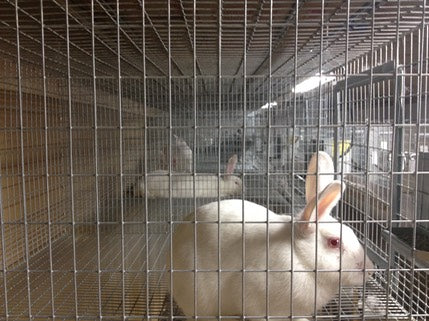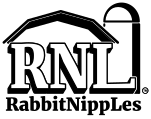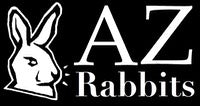
Get started with a good foundation stock. Beware of fly-by-night sellers and find a reputable breeder to get your rabbits. A good foundation can make a huge difference in your production. And always be skeptical of the seller. Physically inspect the parents as they are an indication of what the offspring will become.
A good way to start small is by getting 1 buck and 1 to 2 does. This will allow you to start your breeding on a small scale and learn the basics. Later you may want to add another buck from a different line (this has both advantages and disadvantages) and a few more does. You will then be able to keep the best quality young and breed them order to maintain optimal results. Having 2 bucks also protects your breeding program if one of your bucks dies, giving you time to raise another while still using your remaining buck for breeding.
Just be sure that if you are just starting out, start small. Making mistakes on a small scale is much better than making them on a large scale. As you learn the ropes, grow your rabbitry. And no matter how much you study on the subject, you will always be making improvements.
Also, make sure you are getting your information from qualified producers. Everyone is willing to give free information, whether accurate or not. And especially with the Internet, anyone can claim to be an expert while sitting behind the keyboard. Unfortunately even many veterinarians are lacking correct information on raising rabbits and may give inaccurate advice to their clients. When finding a vet, make sure they know and understand rabbits. And ask people who have the same goals as you. Raising a rabbit for show is completely different than raising a rabbit for meat production. And even those raising rabbits for meat production vary dramatically from the casual breeder who is more interested in the hobby of raising rabbits to the serious breeder who is trying to maximize their results and get the most meat out of every penny spent, while maintaining good, healthy lives for their rabbits. Find those who have been raising rabbits and learned through experience and association with others in the business. Getting correct information at the beginning of your endeavor will save money, headaches and time. It can make all the difference between a very rewarding experience and a less-than-optimal experience.

What Breed?
When deciding what breed to raise, make a list of the qualities you are wanting. If you are wanting to raise rabbits for meat production, get a list of the best rabbits for that purpose. Remember, just because a rabbit is bigger doesn't mean it's better. Some of the larger breeds of rabbits are terrible for meat production because they are not efficiently converting food into meat. Some have very large bones and therefore a larger portion of your money (cost of feed) is not going toward meat, but non-edible parts of the rabbit (bones). It is true that some of these rabbits were used in the creation of today's meat rabbits, but they were crossed with other breeds and these non desirable traits (such as large bones) were bred out of them over multiple generations.
Also, just because your neighbor is raising this and that type of rabbit for meat doesn't mean it's the most efficient thing to do. Listen to the experts. Find out what experts are recommending. Find out the pro's and con's of the different breeds, then make an educated decision.
At the same time, if optimal meat production isn't your top priority and you'd rather have a diversity of different breeds, colors, fur textures and sizes, then go for it! Understand that all domestic rabbits are edible. Enjoy the experience of raising rabbits and if diversity is more important then maximizing feed to meat ratios, then find the breeds you'd enjoy.
Unfortunately, you can't always trust people about where their rabbits come from. It is a good idea to ask around and find a breeder with a good reputation and someone who has been around a while. You don't necessarily have to have pedigrees, but make sure the breeder keeps good and detailed records and/or pedigree paperwork so the rabbits you are buying have a tracked lineage.
Also make sure that the foundation stock you are getting aren't full brothers and sisters. Having the same father is acceptable (assuming the rabbits are of high quality), but different mothers is preferred in order to be able to pin point the traits you want and use selective breeding to maximize those traits. Unless you are experienced in breeding, starting with a full brother and sister may often results in decreased or inferior results generations down the road (not knowing what traits to look for and unexperienced with selective breeding and culling). Bad (and good) qualities in the genes can be amplified by inbreeding and is a great tool, but requires knowledge first. Line breeding (breeding a daughter to her father or a son to their mother) is more acceptable because it is more forgiving in mistakes, but shouldn't be a common practice either until more experience is obtained. These methods (inbreeding and line breeding) are how new breeds of rabbits were started and how the best stocks are obtained. So pay attention to their relationships to each other and they offspring from certain breedings. (More about inbreeding at the bottom of the "Breeding" page of this website)
Last of all, don't be afraid to start over. If you feel like you've gone in the wrong direction, start fresh and do it right. There's no time like the present to take action. Remember, the best time to plant a tree was yesterday, but the second best time is today. Just get started!
Pedigrees
Just a word about pedigrees. Be careful about the assumption that by purchasing a pedigreed rabbit, you are getting a quality rabbit. This is most definitely not the case. Pedigrees can be falsified very easily. Claims can be made about what lineage the rabbit has. But it is just a piece of paper and the seller's word is all that guarantees it. Also, even if the pedigree paperwork is correct, the rabbit you are getting could be the runt or of sub-par quality. The seller's reputation and the quality of the foundation stock is far more important than any paperwork. So don't get fooled into the false security of a pedigree.
Here at AZ Rabbits, we do not offer pedigree paperwork on our rabbits. An exception to this is FFA and/or 4H projects where the pedigree is required for showing. However, we do keep very detailed and up-to-date records and all our breeding stock are pedigreed.

Recommended Books
AZ Rabbits will also be publishing a book in the near future. Check back for more details...

"Raising Rabbits At Home"
by C. Park Romney
This is one of the best, to-the-point books ever written on the subject. Unfortunately, it is also hard to find. I picked up my copy in the 80's straight from the author and consider it a must-have.
I'm trying to track down the author and work on another publication run...

"Rabbit Production"
by McNitt, Patton, Lukefahr, Cheeke
This is the "Rabbit Bible" in the rabbit industry. A great reference with a plethora of information. Every serious rabbit producers MUST get this book. It will be extremely helpful and answer many questions correctly. It is also a pretty penny, so be prepared...

"Rabbit Feeding and Nutrition"
by Peter R. Cheeke
This is a very detailed book about nutrition requirements of rabbits. It gets into more detail than the average breeder would ever need. However, it explains a great deal about every aspect of feed and nutrition requirements, suggestions, studies performed, etc. Another must have! Also very expensive as it is no longer in print.

"Storey's Guide to Raising Rabbits"
by Bob Bennett
This book is the most popular rabbit raising book out there. Most of the information is very useful. You would benefit from owning this book and referencing it. Keep in mind that a lot of it is written with small breeds in mind (Florida Whites, Tans, etc) and that seeps through in the info. Still a great book for the rabbit raiser. Also reasonably priced and readily available.


